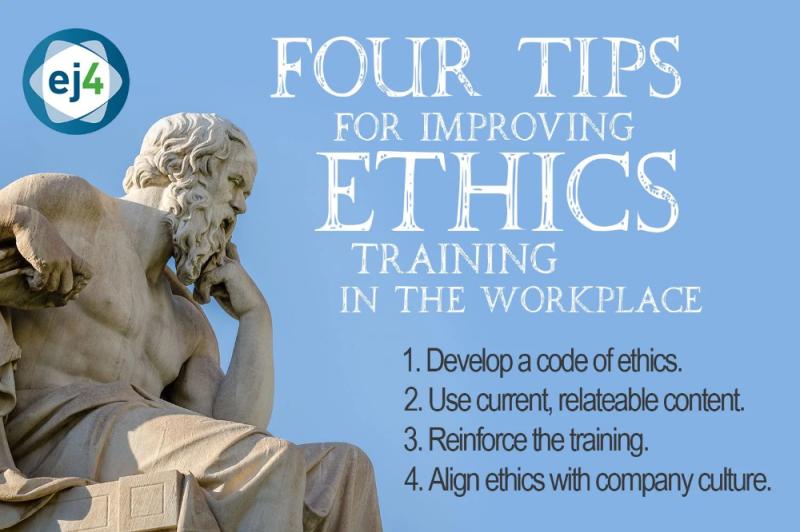Do Your Employees need ethics training?
Yes, providing ethics training for employees is often considered essential for several reasons. Ethics training helps establish a culture of integrity, compliance, and ethical decision-making within an organization. Here are some key reasons why ethics training is necessary for employees:
Promoting Ethical Behavior:
- Ethics training helps employees understand the importance of ethical behavior in the workplace. It provides guidelines on how to identify and navigate ethical dilemmas, make ethical decisions, and act with integrity.
Compliance with Laws and Regulations:
- Many industries are subject to specific laws and regulations related to ethical conduct. Ethics training ensures that employees are aware of these legal requirements and understand the consequences of non-compliance.
Building Trust and Reputation:
- An organization that prioritizes ethics and integrity builds trust with customers, clients, and stakeholders. Employees who understand and adhere to ethical standards contribute to a positive reputation for the company.
Preventing Misconduct and Wrongdoing:
- Ethics training can help prevent misconduct, fraud, and other unethical behaviors in the workplace. Employees who are well-informed about ethical standards are less likely to engage in wrongdoing.
Creating a Positive Work Environment:
- A workplace that values ethics fosters a positive and respectful work environment. Employees are more likely to feel supported and motivated when they know that ethical behavior is valued and rewarded.
Reducing Legal and Financial Risks:
- Unethical behavior can lead to legal and financial consequences for organizations. Ethics training helps mitigate these risks by ensuring that employees understand and adhere to ethical standards, reducing the likelihood of legal issues.
Encouraging Reporting of Unethical Conduct:
- Employees who receive ethics training are more likely to feel comfortable reporting unethical conduct or potential violations. Establishing reporting mechanisms helps organizations address issues before they escalate.
Enhancing Decision-Making Skills:
- Ethics training provides employees with tools and frameworks to make ethical decisions in challenging situations. This helps improve overall decision-making skills and ensures that employees consider ethical implications.
Meeting Stakeholder Expectations:
- Customers, clients, investors, and other stakeholders increasingly expect organizations to demonstrate a commitment to ethical conduct. Ethics training helps organizations meet these expectations and align with societal values.
Adapting to Changing Ethical Landscape:
- The business environment evolves, and ethical standards may change. Ethics training ensures that employees stay informed about evolving ethical considerations and adapt their behavior accordingly.
Implementing a comprehensive ethics training program is a proactive measure that contributes to a positive organizational culture, reduces risks, and aligns with legal and ethical expectations. It is essential for organizations to tailor ethics training to their specific industry, context, and organizational values.
Is ethical training necessary for employees, and what are its potential benefits for a company?
Is ethical training necessary for employees, and what are its potential benefits for a company?
Yes, ethical training is essential for employees and offers numerous benefits for a company. Here's why:
Benefits for Employees:
- Improved decision-making: Ethical training equips employees with the knowledge and framework to make sound choices aligned with the company's values and social responsibility.
- Boosted confidence and morale: Knowing they're operating ethically can make employees feel more confident, valued, and proud to be part of the company.
- Reduced stress and anxiety: Clear ethical guidelines can alleviate uncertainty and anxieties employees might face regarding navigating complex situations.
- Empowered whistleblowing: Training encourages employees to speak up about potential misconduct or unethical practices, fostering a culture of accountability and transparency.
Benefits for Companies:
- Minimized risks and liabilities: Ethical training can help prevent legal issues, financial losses, and reputational damage arising from unethical employee behavior.
- Enhanced brand reputation: A strong commitment to ethical conduct can attract and retain talent, customers, and investors, bolstering brand image and market value.
- Improved employee relations and engagement: Ethical treatment promotes trust and respect between employees and management, leading to a more positive and productive work environment.
- Increased innovation and creativity: When employees feel safe and valued, they're more likely to take risks, innovate, and contribute creatively to the company's success.
- Boosted compliance and regulatory adherence: Proper training ensures employees understand and comply with relevant laws, regulations, and industry standards.
Overall, ethical training is a win-win proposition for both employees and companies. It fosters a positive work environment, minimizes risks, enhances brand reputation, and ultimately contributes to long-term success.
Here are some additional points to consider:
- The effectiveness of ethical training depends on its design, delivery, and follow-up. It should be engaging, interactive, and tailored to the specific needs of the workforce and the company's values.
- Ethical training should be ongoing, not a one-time event. Regular reinforcement and updates are crucial to maintain awareness and build a strong ethical culture.
- Leadership plays a crucial role in setting the tone for ethical behavior. Leaders must demonstrate commitment to ethical principles through their own actions and decisions.
By investing in ethical training, companies can cultivate a workforce that is not only skilled and productive but also responsible and ethical, contributing to a more sustainable and successful future for everyone involved.












